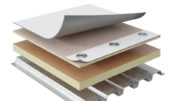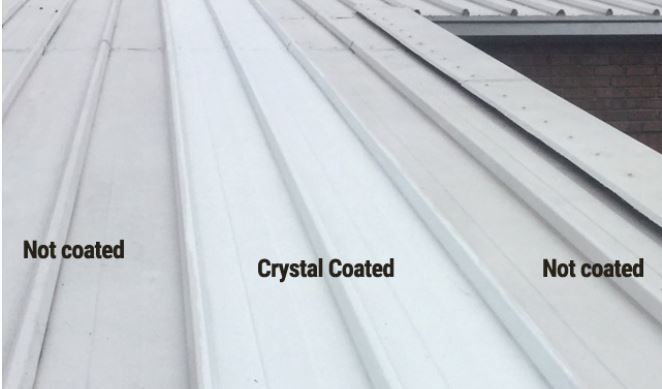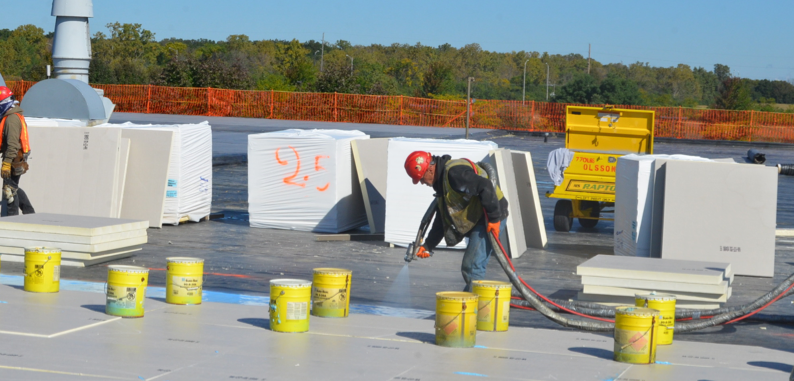As the construction landscape evolves, customer demand for greater efficiency, durability, sustainability, and affordability has resulted in many leading contractors looking to include other mainstream materials and techniques they may not have previously considered. Among these, spray foam insulation stands out as a versatile solution for many projects from the super simple to the overly complex, offering a variety of benefits when applied under the guidance of proven experts. But that poses a new question — how can a roofing contractor know that their partner is knowledgeable about spray foam and the intricacies of its use?
We will first look at the basics of spray foam insulation, the benefits it can offer, questions you should be asking, and how to locate the right partner to get your project from start to finish with limited challenges along the way.
The Benefits: Getting to Know the Product
When applied correctly, spray foam insulation offers long-term benefits designed to last across the life cycle of your structure, from the basement to the roof. But to ensure that spray foam is the ideal insulation solution and that it is applied correctly, it is important to work with technicians who can provide that expertise.
Did you know that while spray foam does offer a multitude of benefits, not every method of spray foam is going to be beneficial for every project? Some contractors don’t, and that is where the wrong partner could end up doing more harm than good.
It is important to note that spray foam insulation is not a singular type of product; there are two commonly used variations — open cell and closed cell — each of which offers a variety of sub-variations that can solve an assortment of challenges.
· Open cell spray foam is a type of polyurethane foam where the cells are not completely closed but are broken, allowing air to fill the open spaces within the material. This results in a softer and more flexible foam application that can be quickly modified to fit the project space.
· Closed cell spray foam, also made of polyurethane, consists of cells that are completely closed and packed together. Able to be exposed to the elements, this foam’s closed structure creates a denser and more rigid foam with excellent insulating properties, greater resistance to moisture, and possible space-saving qualities, though the effectiveness may be limited by the thickness at which it is being applied.
One other factor to note about spray polyurethane foam is that it is one of a handful of products where the contractor installing it is also responsible for manufacturing it. When you manage a product’s development from start to finish, you become more acutely aware of the benefits and also the pitfalls that can occur when handled incorrectly. With so many variables to manage — ambient temperature, correct substrates, moisture content — if you don’t adhere to the details, you won’t reap the benefits. That is why having a technician who knows both the product and possible alternative solutions is a must for any project with tight timelines or other considerations to navigate.
Spray foam insulation can be the preferred choice for many building projects, even allowing for solutions that no other available product can provide. Depending on project need and whether open or closed cell spray foam is used, the benefits can include:
· Excellent insulation performance: Both open-cell and closed-cell spray foam have strong insulating properties, minimizing heat transfer and reducing energy consumption.
· Air barrier properties: Both forms of spray foam act as robust air barriers, preventing air leakage, enhancing indoor air quality and comfort, and reducing energy loss.
· Versatility: Spray foam adheres to various substrates, making them adaptable to a wide range of construction projects, from new builds to retrofits.
· Continuous application: The spray application process allows both open-cell and closed-cell foam to conform to irregular shapes, fill gaps efficiently, and cut back on additional work.
· Longevity: Properly installed spray foam insulation can last for the life of the building without degradation, providing long-term energy savings without maintenance.
· Environmental benefits: Spray foam contributes to sustainable building practices by reducing energy consumption, lowering greenhouse emissions, and allowing indoor air quality to be better managed.
· Moisture control: Closed-cell spray foam provides exceptional moisture resistance, mitigating the risk of water vapor infiltration and mold growth within the building envelope.
· Strength and structural support: Closed-cell spray foam adds structural rigidity to walls and roofs, enhancing overall strength and durability, as well as resistance to wind uplift and storm impact.
· Cost savings: Despite higher upfront installation costs, both open-cell and closed-cell spray foam can deliver significant long-term savings through reduced energy bills, lower maintenance expenses, and improved building quality.
To more fully understand the best use for open cell foam, closed cell foam, or some other building product solution, it is important that you always take into consideration the specific needs of your project. This is why the right technicians should be brought into initial project conversations. They can help guide you to the right option based on a full assessment of factors and criteria. Some questions you or your insulation technician partners need to ask may include:
· Are there specific challenges with the building’s thermal efficiency that require consideration of various insulation products or solutions?
· Are there areas where an air barrier or vapor retarder is needed, and if so, which insulation materials or methods might be suitable for achieving this?
· How can concerns regarding air quality and control of air exchanges within the building be addressed, and what insulation options might contribute to this?
· In areas with distinctive junctions or dissimilar building materials, what insulation solutions could provide continuity and effectively address factors unique to this project?
· Have factors such as temperature fluctuations, substrate conditions, and ambient temperature been thoroughly considered to ensure the successful installation of insulation materials, regardless of type?
· Are all project team members aware of the complexities involved in insulation installation, including manufacturing processes, and do they possess the necessary skills and knowledge?
The successful application of spray foam hinges on finding a contractor who possesses the expertise and experience to help answer these questions and ensure optimal results.
Search for a Solutions-First Approach

Finding the right partner is essential. Collaborating with knowledgeable technicians can significantly impact the success of your roofing projects. This type of fresh perspective will help determine whether spray foam is the right insulation for your project, and if it is, help to ensure that spray foam is applied correctly, mitigating issues such as off-ratio foam, poor adhesion, jobsite conditions, temperature and moisture content levels, or incorrect thickness.
Some great qualities of technician partners you can trust will include:
· Solution-oriented mindset: Partners should prioritize finding solutions tailored to the specific needs of each project, rather than promoting a one-size-fits-all approach.
· Early involvement in design: You should engage experts early in the design process to provide continued guidance and ensure the optimal application of whichever building construction solution is needed, including spray foam.
· Tailored solutions for specific needs: Technicians should offer customized solutions to address overall project requirements along with specific considerations for how one recommendation may impact the building’s design and functionality.
· Clear communication: Effective communication between contractors and clients is crucial for aligning expectations, ensuring project goals are met, and reducing future issues.
· Innovative mindset: Your partners should embrace innovation and remain updated about the latest advancements in technology and application techniques to deliver the best results.
· Commitment to excellence: Technicians willing to go the extra mile to prioritize quality and customer satisfaction are valuable partners in achieving continued success.
Partnering with technicians who adopt a solutions-first approach is crucial for the success of projects involving spray foam insulation. These experts will understand the technical nuances of a project, prioritize overall goals, offer tailored solutions, and deliver guidance early in the design process to optimize performance.
Is Spray Foam Right for your Project?
The benefits of spray foam insulation in building projects are undeniable. From enhanced thermal efficiency to improved air quality and structural support, spray foam can deliver many advantages. However, it’s crucial to acknowledge that these benefits must be weighed against project-specific considerations and customer demands.
By understanding how spray foam is properly applied and being aware of common stumbling blocks, such as neglecting an expert’s early involvement in the design phase, you can avoid the risk of having to revisit projects months, years, or decades later.
While spray foam insulation can be a solution for many projects, it is not a one-size-fits-all solution. By educating yourself, partnering with experienced technicians, and considering project-specific needs, you will maximize the efficiency, durability, sustainability, and affordability of your work and deliver better results for your client.
About the author: As the manager and a third-generation leader for Goley Insulation, Joseph Goley has worked for the Dupo, Illinois-based insulation contractor since February 2019. His primary goals include the development of innovative strategies and solutions to help ensure the success of the company in its next generation. Goley is a member of the Owens Corning CEE Customer Advisory Council, the Knauf Insulation Customer Advisory Board, Home Builders & Remodelers Metro East Association Board, and Southern Illinois University Edwardsville’s Construction Management Industry Advisory Board. Goley Insulation specializes in spray foam, fiberglass, and cellulose insulation as well as energy testing and air sealing in both small and large-scale construction projects for new and existing homes and commercial buildings. For more information, call (618) 286-3355 or visit goleyinc.com.






Be the first to comment on "Spray Foam Insulation: Maximizing Benefits with the Right Partner"